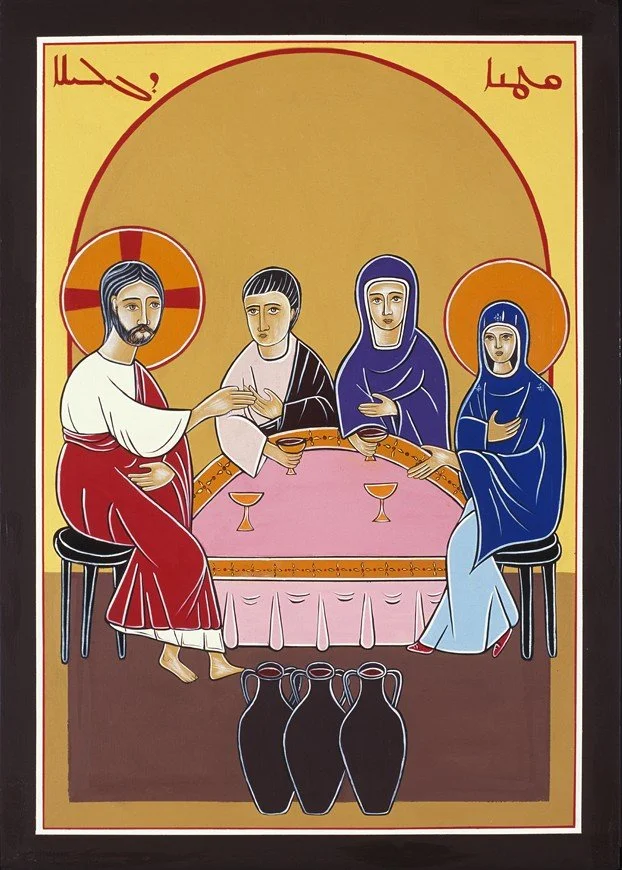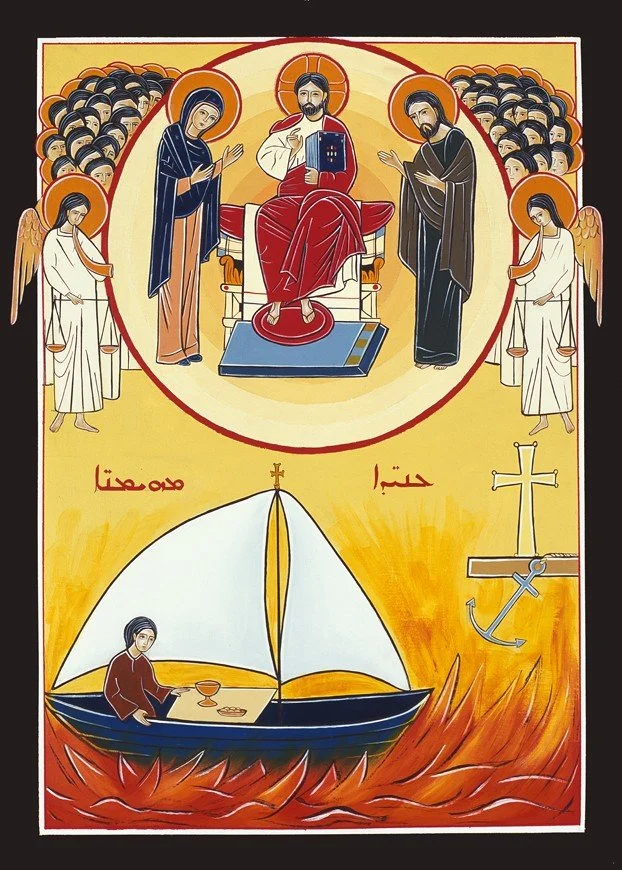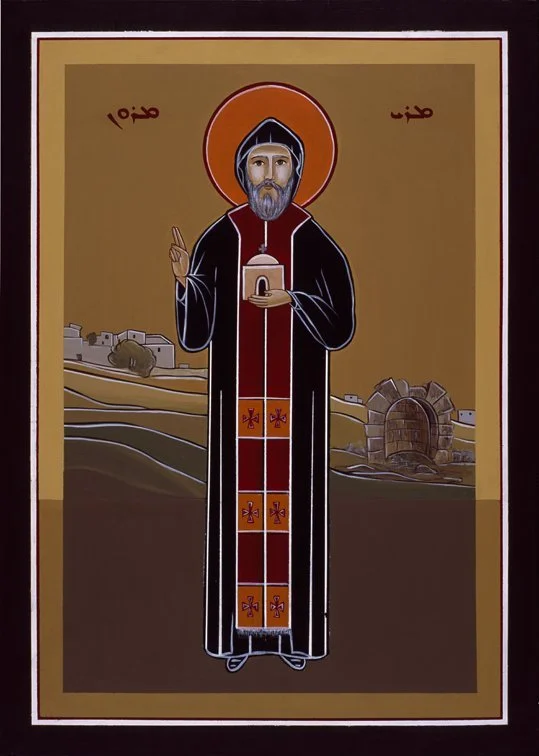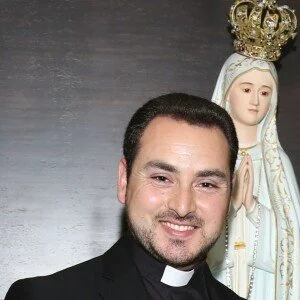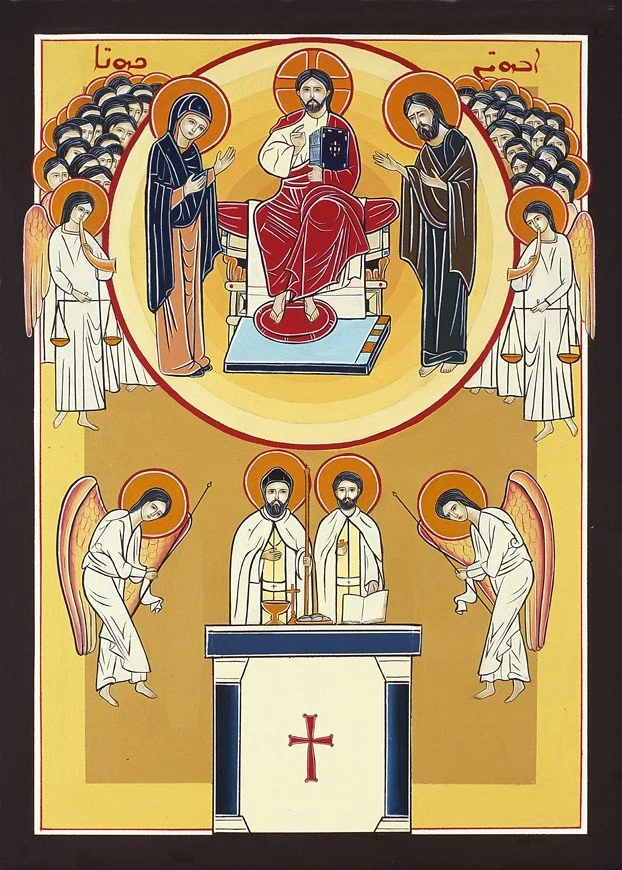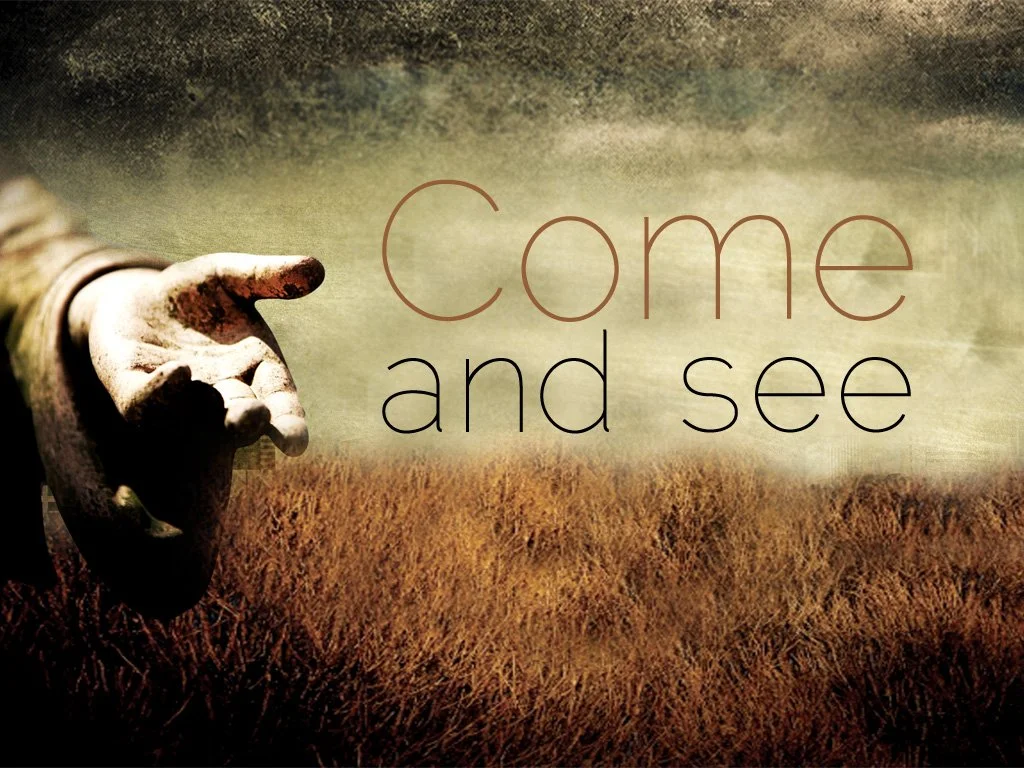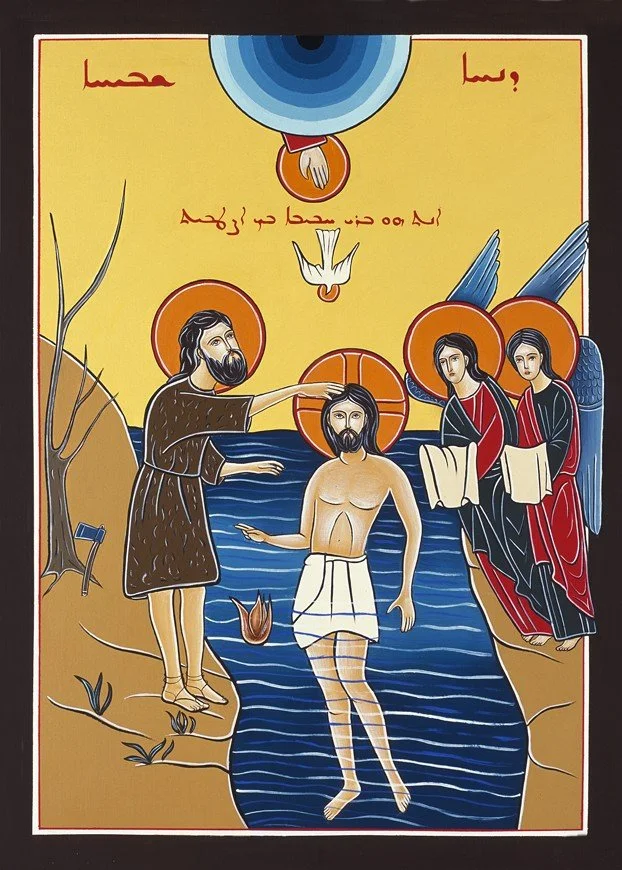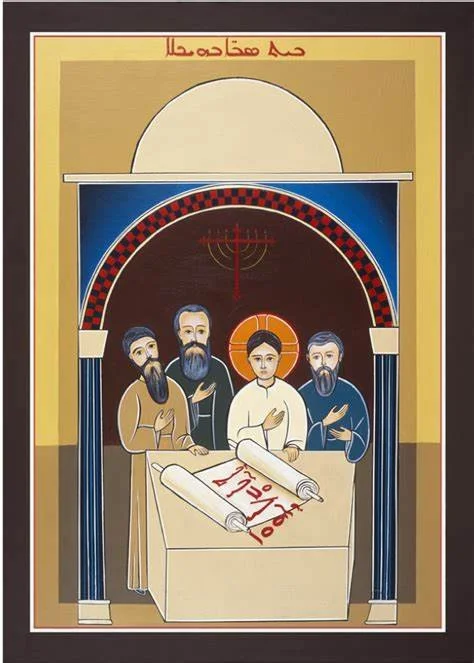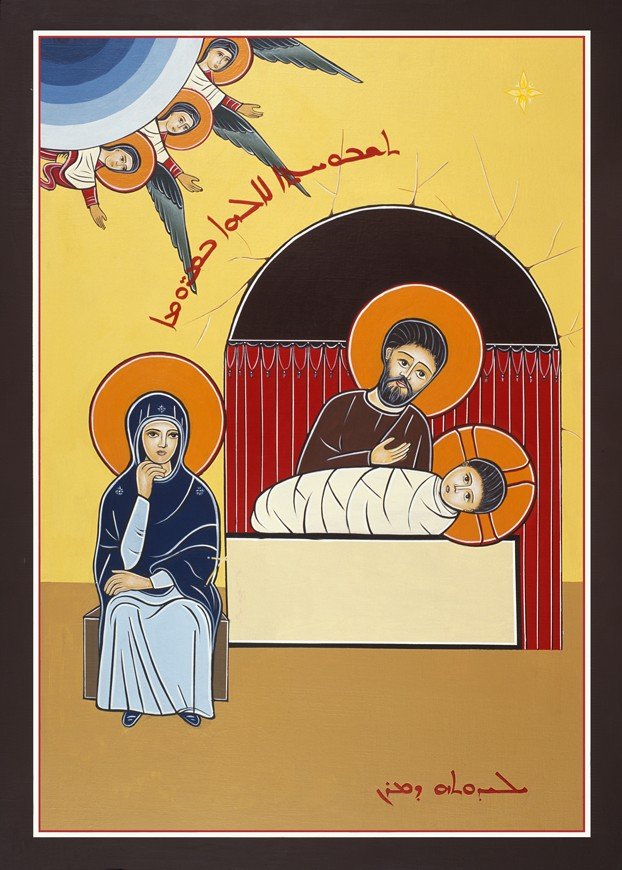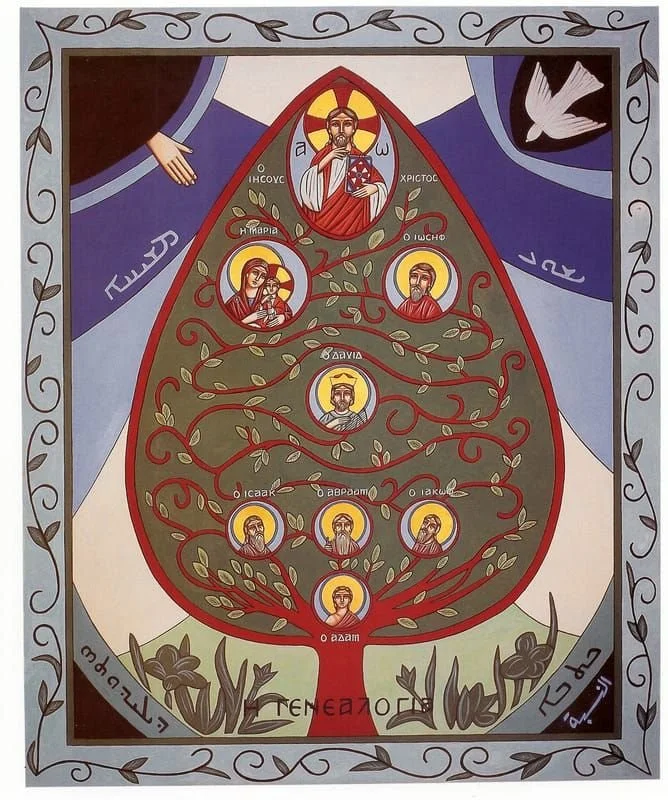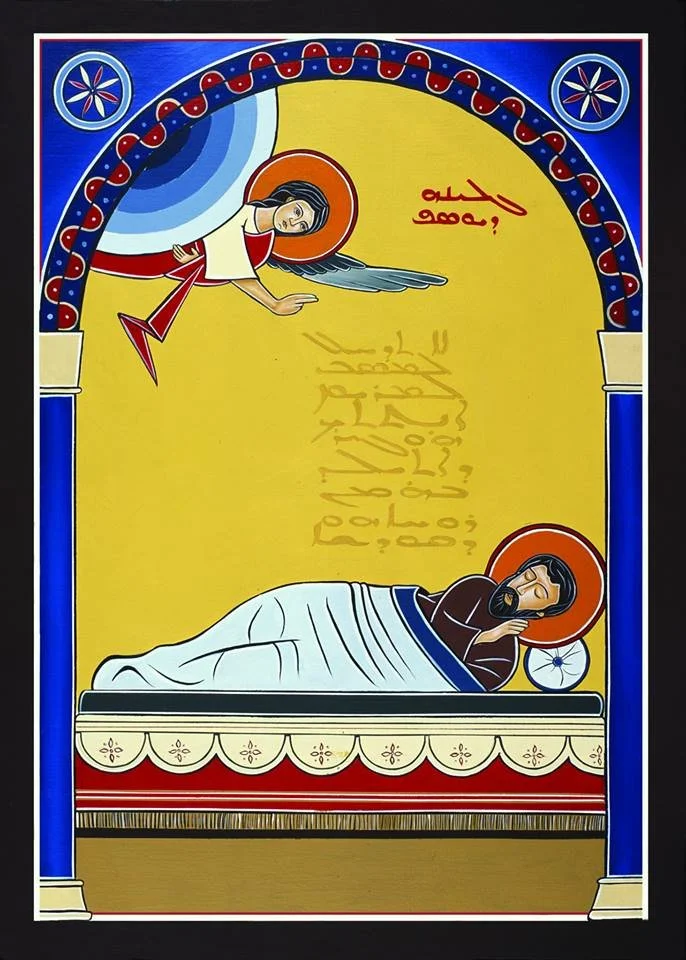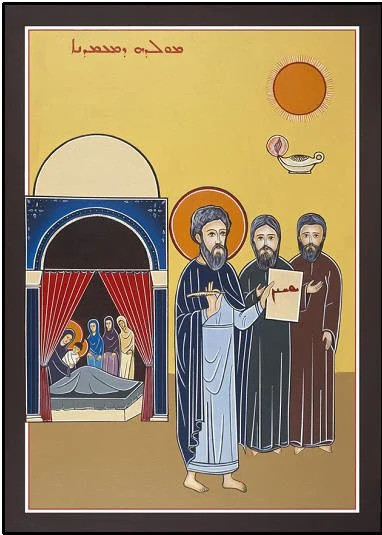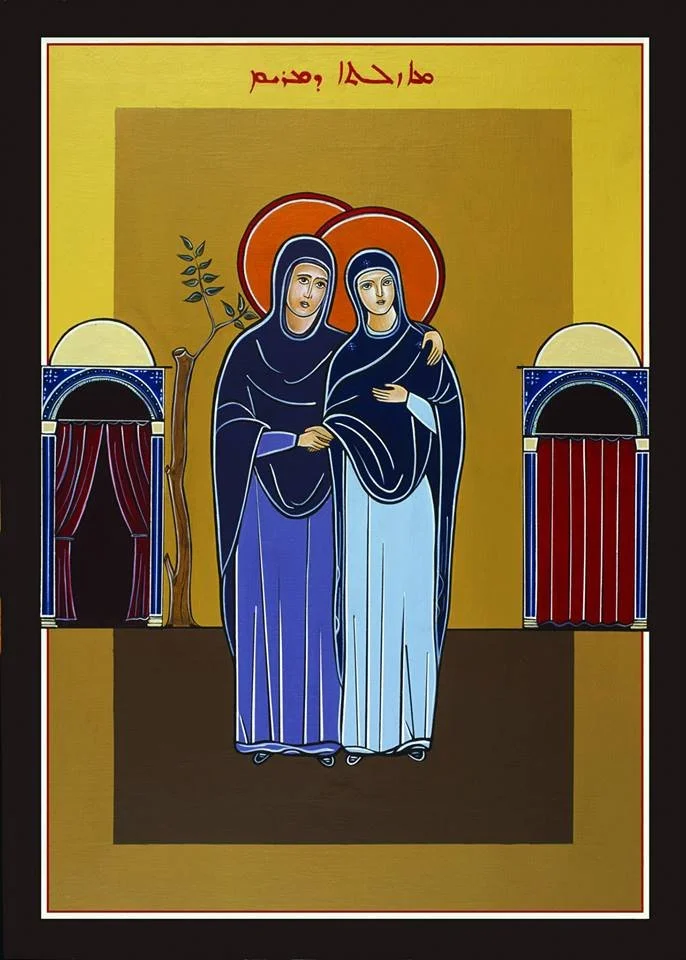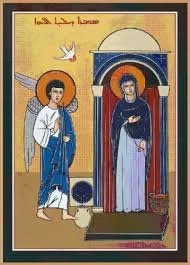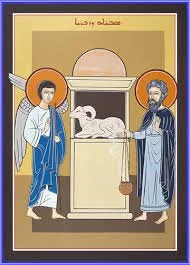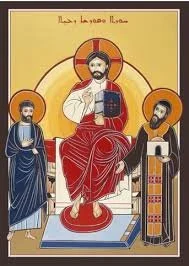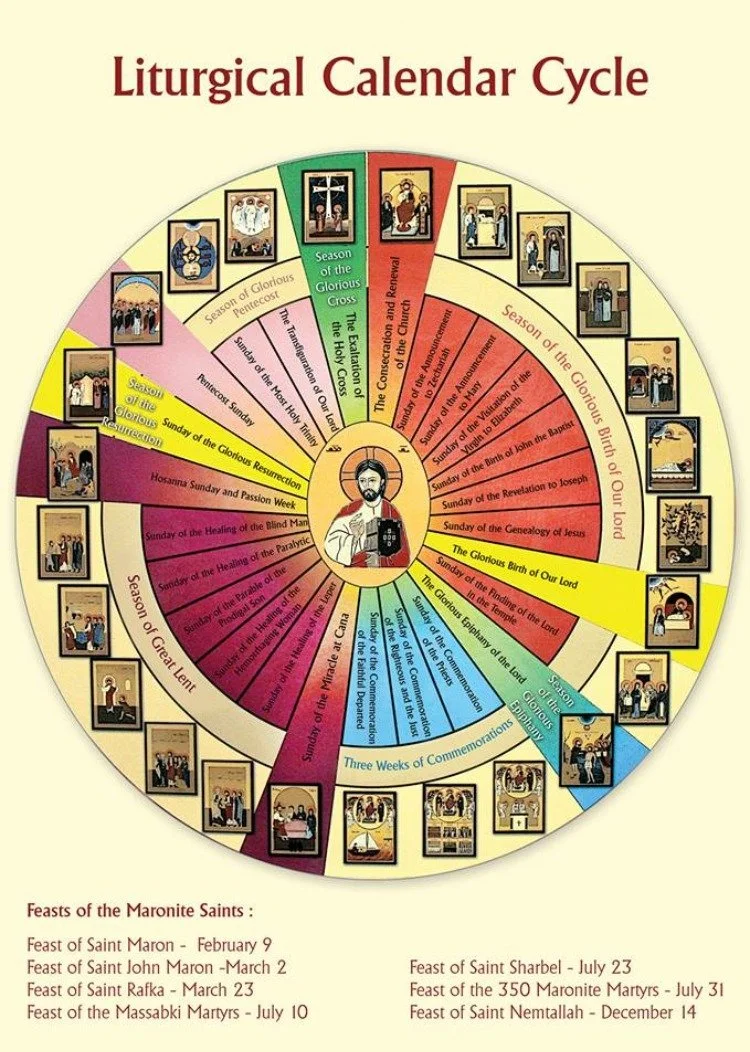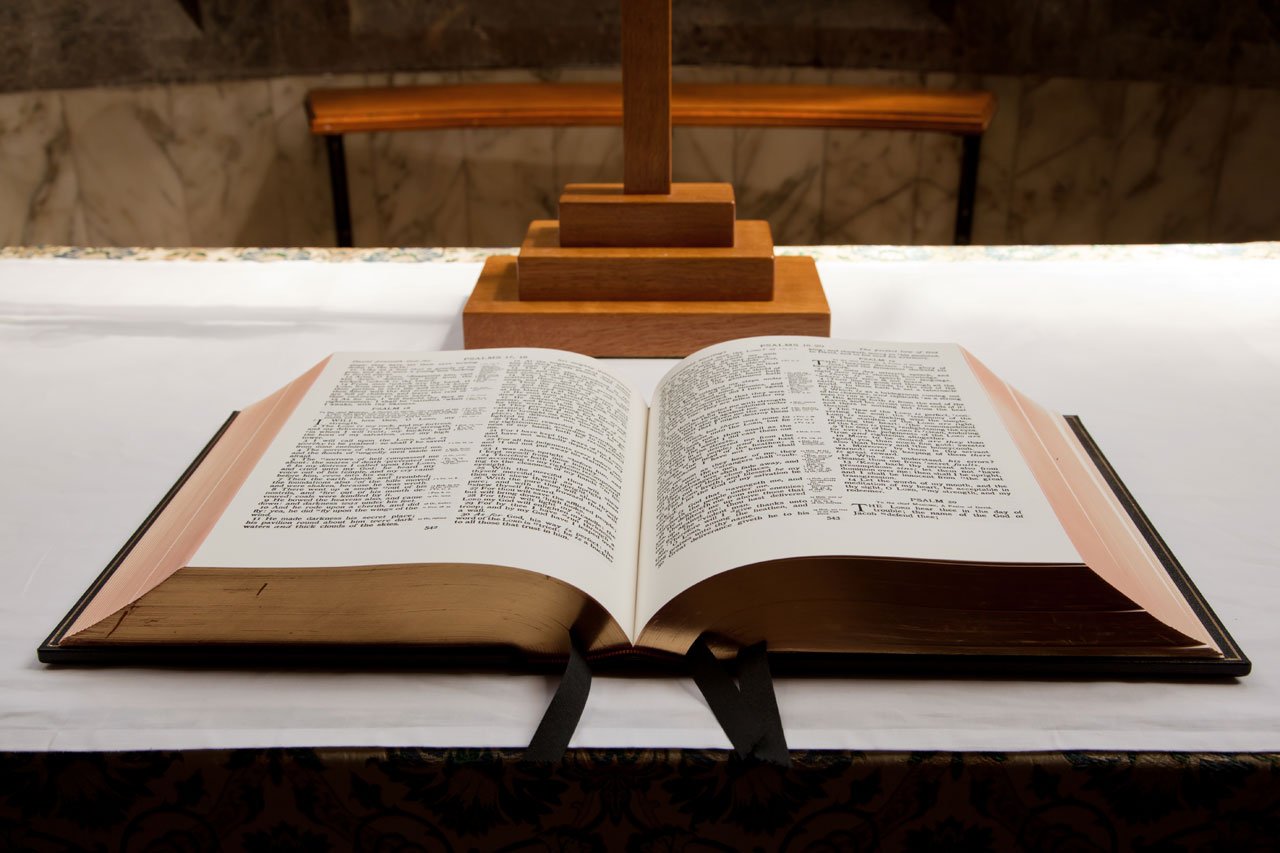
Abouna’s Corner
“From the Well of the Word”
~by Abouna Joe
Sunday of the Entrance into Lent: The Miracle at Cana in Galilee
Cana Sunday: The First Step of a Lenten Journey leading to the "Marriage Supper of the Lamb" In the Maronite tradition, the First Sunday of Great Lent begins not in the desert, but at a wedding feast. At Cana of Galilee, joy fills the room—until the wine runs out. This quiet crisis becomes the moment of revelation, the moment when Christ begins to show who He is. Through the prophet Isaiah, a divine invitation is extended: "Come to the water… listen, that you may have life." Lent initiates this invitation. Prior to any fasting, repentance, or exertion, a fundamental thirst exists. God does not admonish our perceived emptiness; rather, He addresses it with profound generosity. He encourages us to seek Him while He is accessible, with the assurance that His word, akin to rain upon the earth, consistently yields results. At Cana, Mary notices what others miss: “They have no wine.” She brings human need to divine mercy. Jesus responds not with reproach, but with abundance— ordinary water transformed into new wine. This sign points beyond the miracle itself: when we place what we have into Christ’s hands, even our emptiness can become a place of grace. In his Epistle to the Romans, Saint Paul emphasizes that authentic faith is demonstrated through love and mutual responsibility. Lent represents not merely individual discipline, but a collective transformation. Our decisions ought to be constructive, rather than detrimental; they should draw others nearer to Christ, not alienate them. Cana Sunday teaches us that Lent is a journey of transformation. If we listen to God’s word, trust like Mary, and act with love, Christ will quietly turn the water of our lives into the wine of His Kingdom. The journey has begun—let us walk it with repentance, hope, and joy, in the footsteps of our patron Saint Rafqa and all the saints.
From Dry Bones to Living Grain: Hope That Never Dies
This Sunday marks the observance of All the Faithful Departed within our Maronite Liturgical Calendar, coinciding with our parish's celebration of the Feast of Saint Maron, typically observed on February 9th. These two commemorations converge at a profound intersection: memory and hope, death and Resurrection, earth and heaven.
In the vision of the prophet Ezekiel (Ez 37:1-10), the Lord leads us into a valley of dry bones—lifeless, scattered, and silent. Yet God speaks, the Spirit moves, and what seemed beyond repair begins to live again. This is not only a promise for the end of time; it is a promise for every generation of believers who, like Saint Maron and Saint Rafka, trust that God’s breath is stronger than death itself.
Saint Maron lived this hope with radical faith. In solitude, prayer, and sacrifice, he chose the path of the grain of wheat spoken of in today’s Gospel (John 12:23-30): “Unless a grain of wheat falls into the earth and dies, it remains just a grain of wheat.” His hidden life bore fruit far beyond what he could see—fruit that continues in the Maronite Church through our Saint Sharbel, Saint Rafka, Saint Nimatullah, the Massabki brothers, Blessed Estephan - to name a few, and in all who seek God with sincerity of heart.
On this Sunday, as we remember our faithful departed, Saint Maron teaches us how to grieve with hope. Death does not have the final word. The lives of those who have gone before us—parents, grandparents, priests, friends or even children—are not lost. Like the grain sown in the earth, they are entrusted to God, awaiting the fullness of resurrection.
Saint Paul’s words to Timothy (2 Timothy 3:10-17) remind us that perseverance in faith, rooted in Scripture, forms us for this journey. The Word of God trains our hearts to trust when answers are hidden and to remain faithful when the path is narrow.
As we honor Saint Maron and pray for our departed loved ones, we renew our confidence in the God who raises dry bones, brings life from death, and transforms loss into glory. May their memory strengthen our faith, and may our lives, like theirs, become seeds of hope for the world to come.
Learning about the Saints: St. Maron
"Historia Religiosa" or as it's known "The History of Monks and Hermits”, written by the grand historian Theodoret of Cyrrhus around 440 A.D., is our only source on St. Maron (Maroun)'s biography. Theodoret mentions that St. Maron avoided earthly glory, detested fame, and preferred solitary life on the mountain; so, he went on a rugged mountain, half-way between Cyrrhus and Aleppo, where there was a huge pagan temple for the god Nabo. There, St. Maron consecrated the temple for Christian worship and transformed it into his hermitage, although he had many disciples. The fruits of his holiness spread all over the world and his sainthood became known throughout the Empire. St. John Chrysostom sent him a letter around 405 A.D. expressing his great love and respect and asked St. Maron to pray for him. The fame of Maron’s great holiness worked like a magnet that attracted a multitude of monks around him, who wished to be under his guidance following Jesus in the narrow tough paths of holiness. Maron organized them in solitary hermitages according to the monastic tradition of that 35time. Then, he established for them monasteries and rules and accompanied them with his prayers and guidance. These Maronite monasteries multiplied and grew up, especially in the northern lands of Syria. Saint Maron died around the year 410. However, his spirituality would live forever, carried out by his disciples all over the world. The Maronite Church is centered in Lebanon today, wherein it flourished and spread out its branches to all over the world, where its children carry with them the devotion to their holy father Maron.
Introducing Father Joe Daccache
Born on March 24, 1984, Father Joe Daccache is a Maronite Catholic priest ordained within the Archdiocese of Beirut, Lebanon, and recently incardinated in the Eparchy of Our Lady of Lebanon of Los Angeles. He was ordained at Saint George's Cathedral, Beirut, on May 30, 2009. In January 2026, His Excellency, Elias A. Zaidan, the Maronite Bishop of Our Lady of Lebanon of Los Angeles, appointed him as Pastor of Saint Rafka Maronite Church in Lakewood, CO. Previously, Father Daccache served as Pastor of the Saint Sharbel Maronite Mission of Milwaukee, WI, and as an assisting priest for the KR Catholic parishes, a cluster of four Roman Catholic churches in the Union Grove area, WI. Concurrently, he held a part-time chaplaincy at The Village at Victory Lakes in Lindenhurst, IL, and subsequently taught Theology at Catholic Central High School in Burlington, WI. Prior to his tenure in Wisconsin, he served as Rector of Sagesse High School (pre-K to 12 Lebanese American school) in Ain Saade, Lebanon, from 2019 to 2021. Before this, Father Daccache spent six years in the USA as Administrator of Saints Peter and Paul Parish in Simi Valley, California, while pursuing graduate studies at Loyola Marymount University in Los Angeles. Father Daccache possesses extensive experience in teaching and counseling at Sagesse High School, as well as in school administration at St. Rose of Lima Elementary School in Simi Valley (2013-2016) and other schools in Los Angeles and Orange counties where he completed his internship. Father Joe Daccache holds a Master of Divinity degree in Theology from the University of The Holy Spirit, Kaslik (Lebanon), a Master's degree in Psychology from the Lebanese University, Fanar (Lebanon), a Master's degree in Catholic School Leadership and Administration, and an Educational Doctorate (Ed.D.) in Leadership for Social Justice from Loyola Marymount University (LMU), Los Angeles. Father Daccache's core competencies include active listening and strategic planning, and he is recognized as a visionary leader. He demonstrates a keen interest in science, technology, philosophy, and the arts. He deeply values his Catholic faith, his Eastern Maronite rite, and diversity. He is passionate about prayer, education, meeting new individuals, and exploring diverse countries and cultures. Furthermore, Father Joe enjoys travel, adventure, and sports (including scuba diving, swimming, basketball, biking, hiking, skiing, and ping pong), and cherishes time spent with family and friends.
A Special Message from Deacon George Karam
January 2026
Dear Abouna Habib,
On behalf of our entire parish community, we want to express our deepest gratitude for your years of dedicated service and spiritual guidance. Your leadership and compassion have profoundly impacted our church family, and while we are saddened to see you go, we wish you every blessing in your next chapter.
At the same time, we are thrilled to extend a warm welcome to Father Joe Daccache. We are excited to begin this new journey with him and look forward to the unique gifts and vision he will bring to our congregation. Please know that our prayers and support are with both of you during this time of transition.
In faith and gratitude,
Deacon George Karam and the parishioners of St. Rafka Maronite Church, Lakewood, CO.
Sunday of the Priests
Today we celebrate the Sunday of the Priests, and the parable tells us the story of the faithful and unfaithful servant whom his master has put in charge of his servants to give them the allowance of food at the proper time. What information are we going to take about this servant from this biblical account? What was his history? What was he like? What happened to him? What lessons can we learn from his story? In what ways do our lives parallel his? Let’s take this passage apart and find out what it says to us. He was chosen to be in the service for his Master Yes, every priest is the servant for God. We are called to serve God through serving God’s Children, which means to offer for them the allowance of food at the proper time. Surely our responsibility is not only to offer the food of the flesh but the food of the souls. I mean the word of God and the sacraments. The gospel passage said, “Blessed is the one whom his master finds him doing so, he will put him in charge of all his households.” His faithfulness helped him climb the ladder of success as his loyalty and diligence caught the attention of his Master who wants to give him a better place in his Kingdom and save his soul from eternal damnation. Because He was a trustworthy Servant, He was responsible for managing the household and feeding the master’s family. He was considered the master substitute, and the Master had delegated his own responsibilities to this servant. Jesus has sent us to do his work in this world, to take care for God’s children, to be there for them. St. Paul expounds on this charge in 1Timothy (the full passage can be found on page 4): To Command and teach them the heavenly things.12 But also to set an example for the believers in speech, in conduct, in love, in faith and in purity. 13 Until I come, to devote ourselves to the public reading of Scripture, to preaching and to teaching. To not neglect the gift that we received from God, which was given you through prophecy when the body of elders laid their hands on us. But the faithful servant turns to be unfaithful He began neglecting his master’s return. Reputation is what others see you do; character is what you do when there’s no one watching. This man’s true character came out when his master’s back was turned. He lost his sense of accountability; the Master wasn’t there to look over his shoulder. Everybody needs to be accountable to somebody! He began to live just for the moment, with no thought of the future. He began to mistreat others and engaged in sinful behavior. His job began to suffer, (you can’t be diligent in pursuit of the master’s business and pursue your own selfish, sinful desires at the same time.) Because our Master is not a man with skin, we sometimes forget that He is still watching us. Jesus warned us to be watchful for the master’s return. Don’t let the Master’s delay lure you into unchristian living; Jesus is coming soon at a time that we do not expect.! His judgment was unimaginably severe. For that servant who took advantage “He will tear the servant apart and banish him with the unfaithful.” He was punished and placed unfaithful, with the wrong doers. However, our Lord is the Lord of forgiveness. Our heavenly Father is ready to take you back. If you are like that servant, go before God in repentance. He will pardon your sin and restore you. Amen.
Here are two beautiful scripture readings that build on the message of today’s Gospel. Malachi 2:1-9 1 “And now, O priests, this command is for you. 2 If you will not listen, if you will not take it to heart to give honor to my name, says the Lord of hosts, then I will send the curse upon you and I will curse your blessings. Indeed, I have already cursed them because you do not lay it to heart. 3 Behold, I will rebuke your offspring, and spread dung on your faces, the dung of your offerings, and you shall be taken away with it.[ 4 So shall you know that I have sent this command to you, that my covenant with Levi may stand, says the Lord of hosts. 5 My covenant with him was one of life and peace, and I gave them to him. It was a covenant of fear, and he feared me. He stood in awe of my name. 6 True instruction[c] was in his mouth, and no wrong was found on his lips. He walked with me in peace and upright, and he turned many from iniquity. 7 For the lips of a priest should guard knowledge, and people should seek instruction from his mouth, for he is the messenger of the Lord of hosts. 8 But you have turned aside from the way. You have caused many to stumble with your instructions. You have corrupted the covenant of Levi, says the Lord of hosts, 9 and so I make you despised and abased before all the people, inasmuch, as you do not keep my ways but show partiality in your instruction.” Timothy 4:6-16 The Spirit clearly says that in later times some will abandon the faith and follow deceiving spirits and things taught by demons. 2 Such teachings come through hypocritical liars, whose consciences have been seared as with a hot iron. 3 They forbid people to marry and order them to abstain from certain foods, which God created to be received with thanksgiving by those who believe and who know the truth. 4 For everything God created is good, and nothing is to be rejected if it is received with thanksgiving, 5 because it is consecrated by the word of God and prayer. 6 If you point these things out to the brothers and sisters, you will be a good minister of Christ Jesus, nourished on the truths of the faith and of the good teaching that you have followed. 7 Have nothing to do with godless myths and old wives’ tales; rather, train yourself to be godly. 8 For physical training is of some value, but godliness has value for all things, holding promise for both the present life and the life to come. 9 This is a trustworthy saying that deserves full acceptance. 10 That is why we labor and strive, because we have put our hope in the living God, who is the Savior of all people, and especially of those who believe. 11 Command and teach these things. 12 Don’t let anyone look down on you because you are young, but set an example for the believers in speech, in conduct, in love, in faith and in purity. 13 Until I come, devote yourself to the public reading of Scripture, to preaching and to teaching. 14 Do not neglect your gift, which was given to you through prophecy when the elders laid their hands on you. 15 Be diligent in these matters; give yourself wholly to them, so that everyone may see your progress. 16 Watch your life and doctrine closely. Persevere in them, because if you do, you will save both yourself and your listeners. Amen. ~Fr. Elbadaoui Habib
Second Sunday after Epiphany
“Rabbi where are you staying?” “Come and see.” Today we celebrate the second Sunday of Epiphany where we see John the Baptist pointing his disciples to Jesus saying, “Here is the lamb of God who takes away the sin of the world.” As a result of this pointing, the two Disciples left John and followed Christ. John (1:35-51) mentions four people who encountered Jesus for the first time and each of them have a different experience. Jesus invites each of them, not to memorize a creed or join an institution, but to follow him and to come and see where he abides. That is the invitation of the Gospel of John; come and see who Jesus is and how we can abide with him each day. Come and see! When something is truly exciting to you, you can’t help but want to share it with others. I wonder, have you ever felt that way about Jesus? I’m not talking about being excited about how cool you think your church is that you want to invite your friends. I’m talking about Jesus. Does the fact that you know Jesus get you so excited that you just want to tell all your friends? Come and See. It is a journey through the life of Jesus according to the Gospel of John. Here’s my prayer for you. I hope that you get so excited about Jesus, that you can’t help but talk about it. Today’s passage of the gospel makes us jump into the story of how Jesus meets his first disciples. In this passage of the gospel, we’re going to meet four people, who had personal encounter with Jesus. Each of them encountered Jesus differently. Which one is most like you and your experience with Jesus? Let’s look at the first section: 35 The next day John was there again with two of his disciples, 36 and as he watched Jesus walk by, he said, “Behold, the Lamb of God.” 37 The two disciples heard what he said and followed Jesus. The first person we meet is Andrew. We discover his name in a second. His story begins with John the Baptist. We must remember that the people of Israel were suffering under the oppression of the Roman Empire. They were looking for the Messiah. They were looking for a great prophet, a leader, a king, who would deliver them from oppression. What they were not looking for is a lamb. The only thing a lamb is good for is sacrifice. So, it’s interesting that when Andrew heard that Jesus is the lamb of God, he followed him. 38 Jesus turned and saw them following him and said to them, “What are you looking for?” I think it’s an excellent question, a great question for the New Year. I ask you, what are you looking for? What do you hope this Jesus character can offer for you this year? Notice how they answered: They said to him, “Rabbi” (which translated means Teacher), “where are you staying?” 39 which means where do you live? Jesus answered, “Come and you will see.” That’s kind of a weird response. The word they use is an important word in the Gospel of John. It can be translated into living, dwelling, abiding. Jesus uses it in John when he tells the disciples that he is the vine and they are the branches, if they abide in Him, he will abide in them. This whole Gospel is about learning where God abides, and how God abides there. How does Jesus answer? 39 He said to them, “Come, and you will see.” So, they went and saw where he was staying, and they stayed with him that day. It was about four in the afternoon. We cannot underestimate the power of this phrase. To be a follower of Jesus and to know where God abides is not an idea. It is not a doctrine to be memorized. It is a reality to be experienced. It is a way of life, and you can only know it by going and seeing it for yourself. Let’s read more: 40 Andrew, the brother of Simon Peter, was one of the two who heard John and followed Jesus. 41 He first found his own brother Simon and told him, “We have found the Messiah” (which is translated Anointed). 42 Then he brought him to Jesus. Jesus looked at him and said, “You are Simon the son of John; you will be called Cephas” (which is translated Peter). Notice what happened. Andrew was so excited about finding Jesus, that he went and found his brother, Simon. That’s our second character. Here’s an interesting thing about Simon in this story. He never says a word. Jesus simply meets him and makes big claims about him. You are Peter, which means Rock. The story continues in Monday’s Gospel reading: 43 The next day he decided to go to Galilee, and he found Philip. And Jesus said to him, “Follow me.” 44 Now Philip was from Bethsaida, the town of Andrew and Peter. What happens here? Jesus finds Philip and invites him to follow. Sometimes it seems that God seeks us out directly and has a special call on our life. 45 Philip found Nathanael and told him, “We have found the one about whom Moses wrote in the law, and also the prophets, Jesus son of Joseph, from Nazareth.” 46 But Nathanael said to him, “Can anything good come from Nazareth?” Again, Philip was so excited to be found by Jesus that he goes and finds his friend Nathanael. But notice how Nathanael responds. He doubts. He is skeptical. That seems to be the dominant type in our society. Philip said to him, “Come and see.” He simply followed Jesus’ example. He didn’t try to explain it; he simply invited Nathanael to experience Jesus and where he abides. This is a great story that tells us about finding Jesus and binding in him. I hope you found a little bit of yourself in there. I want to leave you with three simple questions to ponder this week. Where do you abide? We can tell a lot about a person by where they spend most of their time and energy. Talk is cheap. Time and energy are the truth. Are you abiding in the same places Jesus does? I hope our journey through John will bring those things together. Second. Who will you find? Andrew and Philip were so excited to follow Jesus that they went and found their brother and friend and said, “Come and See!” This is the perfect opportunity to invite your friends who are looking for something to join us as we discover where Jesus abides. finally, are you ready to Come and See and meet Jesus in a fresh way? Amen. ~Fr. Elbadaoui Habib
First Sunday after Epiphany
A kite (the bird) was consumed by envy of the eagle. “How come he can fly so high? Everyone admires him and no one admires me.” One day the kite sees a hunter and calls out to him to shoot the eagle. The hunter replies that he would need to add some feathers to his arrow for it to reach the eagle. The kite pulled one of his best feathers and gave it to the hunter. That was not enough to reach the eagle. So, the kite pulled another and then another and yet the arrow was not quite able to reach the eagle. Before long all the kite’s best feathers were gone, and he was no longer able to fly. The hunter simply turned round and shot the kite as his catch for the day. The moral of the story: envy and jealousy consume the person who harbors them before the person for whom they are harbored. There is a difference between envy and jealousy. Envy is dissatisfaction with what belongs to us and coveting what belongs to another. We can envy people for their looks, their possessions or their relationships, wishing we could take their place. Jealousy, on the other hand, is the fear that what is ours may be lost to another. Both envy and jealousy rob people of their inner peace as they devise ways to eliminate the person they perceive as standing in the way to their personal fulfilment. Looking at the way things are in our world today, envy and jealousy are normal human traits. But the example of John the Baptist shows us that true personal fulfilment and greatness lie not in how we may compare with others but in how faithful we are to our God-given roles in life. How many people like to hear that the person who succeeded them is doing better than they did? Nobody. Here John is a rare example. John started the Kingdom of God’s movement. Jesus succeeded him as leader of the movement after Herod imprisoned John and had him executed. Yet whenever John speaks of Jesus he speaks of Jesus as better than him. He describes Jesus as the bridegroom and himself as only his best man (John 3:29). Notice how he introduces Jesus to his own disciples in today’s gospel: The next day he saw Jesus coming toward him and declared, "Here is the Lamb of God who takes away the sin of the world! This is he of whom I said, ‘After me comes a man who ranks ahead of me because he was before me’” (John 1:29-30). As a result of this endorsement, two of his disciples left him and followed Jesus (verse 37). These were the first disciples of Jesus according to John’s Gospel. John summarized his whole attitude to Jesus in one statement: “He must increase, but I must decrease” (John 3:30). Why is John so content and satisfied with playing the second fiddle rather than vying with Jesus for the limelight? It is because he knows exactly the reason for him being in the world. He knows why he came into this life: “I came baptizing with water for this reason, that he might be revealed to Israel” (John 1:30). Because he knows why he is here, John can tell when he has done his bit. He can tell when it is time to hand the baton to another. Why did you come into the world? What is God’s plan for your life? If you do not have a personal answer to this question, chances are that you will spend your life chasing after everything and nothing, in a rat-race of envy and jealousy with those you perceive as better than you. Instead of living and working in harmony and cooperation with others. People who do not know the reason for their being are often driven by rivalry and competition. Look at the flowers in the field. Some are shrubs and some are herbs, some are red and some are white, some are yellow and some are blue; yet all of them are beautiful. The poinsettia, the daffodil, the rose, are all beautiful because they have their different purposes. As move through and past the season of Epiphany, let us have John the Baptist before us as a great example of what it means to be ordinary. The fact is, there is much greatness in being ordinary. Even though John felt he was not worthy to untie Jesus’ sandals, Jesus did turn round to say of him, “Among those born of women there has risen no one greater than John the Baptist” (Matthew 11:11). Amen. ~Fr. Elbadaoui Habib
New Assignments for 2026
Dear family and friends,
Please note that our Bishop made the following appointments yesterday, they will be effective February 1, 2026:
Father Charles Khachan, M.L.M., Rector of Our Lady of Mt. Lebanon-St. Peter Cathedral
Father Piere Elkhoury, M.L.M., Pastor of St. George Maronite Church, San Antonio, TX
Father Jad Chlouk, Pastor of Our Lady of Lebanon Maronite Church, Lombard, IL
Father Joseph Kallas, M.L.M., Pastor of Our Lady of Lebanon Maronite Church, Lewisville, TX
Father Jean-Paul Khoury, Pastor of Our Lady of the Rosary Maronite Mission, Sacramento, CA
*Father Elbadaoui Habib, M.L.M., Pastor of St. Therese Maronite Church, Tulsa, OK
*Father Joe Daccache, Pastor of St. Rafka Maronite Church, Lakewood, CO
Father Marwan Abi Nader, M.L.M., Pastor of St. Ignatius Maronite Church, Dayton, OH
Father Gilbert Walker, Pastor of Holy Trinity Maronite Mission, New Orleans, LA and Pastor of the Maronite Community of Mobile, AL
Father Youssef Barakat, Administrator of St. Sharbel Maronite Mission, Wisconsin
Father Chris Pond, Associate Pastor, Our Lady's Maronite Church, Austin, TX
Father Tony Zghaib, M.L.M., Associate Pastor, St. Jude Maronite Church, West Covina, CA
Please keep all our priests in your prayers.
NB- my final mass is going to be on Sunday January 25 at 11 am followed by Lunch at the church hall. All are welcome.
I am going to be introduced to my new parish on Saturday January 31.
Please pray for the success of this new mission as I will continue holding you and Saint Rafka parish in my heart. Have a blessed Epiphany and note that it is a day of obligation.
Mass tonight at 6:30 pm
Tomorrow at 11:00 am
Fr. Elbadaoui Habib
Finding of Our Lord in the Temple
Today we celebrate the second Sunday of Christmas, and this passage of the Gospel makes us learn some interesting information about Joseph, Mary, and Jesus. Their habit and tradition were that “Each year his parents went to Jerusalem for the feast of Passover, and when he was twelve years old, they went up according to festival custom”. So, we learn in the first verse that Joseph and Mary made the journey to Jerusalem every year for Passover. This shows the devotion they possessed and was probably because they knew from Divine experience that their son, Jesus, was the Son of God. Jewish males were obligated to keep three festivals: The festival of unleavened bread, called Passover, the festival of booths or Tabernacles, and the festival of weeks, or Pentecost. Adult Jewish males who lived within 20 miles of Jerusalem were required to attend Passover annually, while others tried to do it once in their lifetime. “After they had completed its days, as they were returning, the boy Jesus remained behind in Jerusalem, but his parents did not know it.” It seems a little careless that Mary and Joseph wouldn't have noticed Him missing for a whole day, but the way these journeys were completed allows us to understand the situation. When journeys like this were made the men stayed together, the women with the women, and the children with the children. When they searched for him and did not find him, they returned to Jerusalem to look for him. “After three days they found him in the temple, sitting in the midst of the teachers, listening to them and asking them questions, and all who heard him were astounded at his understanding and his answers.” Imagine the panic of parents searching for their child for three days! Jesus was sitting in the temple and sitting was usually a posture for teachers and for students. I don't think that Jesus was sitting in the temple teaching the teachers, but he was, as we read, asking questions and this passage tells us that “All who heard him were astounded,” Luke is telling us that even as a small boy, Jesus was already preparing Himself as a teacher who obviously possessed great wisdom and authority, as we will later read in Luke. “When his parents saw him, they were astonished, and his mother said to him, ‘Son, why have you done this to us? Your father and I have been looking for you with great anxiety.’ And he said to them, ‘Why were you looking for me?” Did you not know that I must be in my father’s house?’” There seems to be a different meaning in this portion of the reading between the reaction of the people in the temple and the reaction of Jesus' parents. The verse states that his parents were “astonished” and astonished means, filled with the emotional impact of overwhelming surprise or shock. Indeed, his parents were searching for Jesus in Jerusalem for three days; I am sure they were a little upset. The question Mary asks Jesus seems to come out of anguish. It is also unusual for a Jewish mother to confront a son; usually the Jewish father would confront a son. Jesus' answer is interesting. Jesus states that He “MUST be in my Father's house”. Jesus is compelled, as the Son of God, to be in the temple and appropriately gives the title “Father” not to His human father but to the Father, God. We see that with a few words. Jesus, at a very young age, is establishing among his peers that He is the Son of God and He must fulfill the duty that His Heavenly Father has predestined. Wouldn't these words be coming out of the mouth of a twelve-year-old shock you? However, if we know that Jesus is the Son of God, then His words are appropriate and right, for the Son of God is the Son of the Father in heaven, and His duty is to His Father, not to Joseph and Mary. We read that Jesus' parents “did not understand what He said to them". Even though Mary and Joseph were visited by Angels, and Mary was conceived by the Holy Spirit, it would have been difficult for any parents to lose their son and find him in a Temple “astounding” people. That’s why we see Jesus acts with obedience to his parents’ instructions: “He went down with them and came to Nazareth and was obedient to them; and his mother kept all these things in her heart." Notice that the verse says “went down” with them. Jerusalem was on a mountain which is a geographically high place, but the temple was also spiritual high ground. I see this verse meaning two things, the most important being that as Jesus became “obedient” to his parents. He had to “come down” from the spiritually high place that He was at in the Temple and come back to the reality that He was also a human man possessing a tent of flesh as the Messiah who had human parents. This verse shows that Jesus in no way dishonored his parents and broke one of commandments, because obedience is honoring one's parents. It might have seemed to be disrespectful to Mary and Joseph for leaving the caravan to go to the temple, but disrespect doesn't lead to sin unless one becomes disobedient. Finally, we read that “Jesus advanced (in) wisdom and age and favor before God and man”. This verse of the Luke’s bible tells us that Jesus was 100% God and 100% man. We see the Son of God emerge at an early age, but we also see that Jesus had to develop and mature. Jesus did not emerge from the womb of Mary as a man, but he was born as a 100% human and was born as an infant as we are to be one of us. This was required for Him. Jesus had to be born as one of us and had to die as one of us. We read about His growth and know that Jesus matures into 100% man as he gets older. The verse tells us about the wisdom and favor Jesus is advancing in. What is wisdom? Wisdom is knowledge but goes beyond the understanding of facts. Wisdom involves values and priorities. It involves understanding not just what is, but what really matters. Divine favor comes from a relationship from God, and human favor comes from relationships with humans. We see that Jesus is growing and developing not only wisdom, but Divine and human relationships as He possesses the tent of flesh. Amen.
~Fr. Elbadaoui Habib
Sunday after the Glorious Birth of Our Lord
The feast of Christmas is one of the most important feasts in our Christian calendar. It is the story of Jesus being born in a manger, a humble birth in Bethlehem. It is a story that tells us that God’s angels and shepherds, and all the heavenly hosts came to worship the baby Jesus the story of the birth of Jesus took place at night, but the baby Jesus’ birth transformed the darkness into light. This was the night when “the light of the world” would be born in the world to dispel all darkness. Luke tells us the story of the birth of Jesus (Luke 2:1-20). In this story, there is one miracle I want you to see and meditate on. It is the miracle of the Incarnation of God in the human flesh. The Word of God, the invisible God, the majesty of the divine nature of God, the logos took his dwelling among us and became a man. The Word that is called in the scripture; “the image of the invisible God that is in him were created all things visible and invisible, whether thrones or dominions, or principalities or power were all created in him.” God, in the Person of Christ, came down to earth and took on our real human nature, while still maintaining His divinity. The story of Christmas is all about the Incarnation of God in the human form through the virgin’s womb of Mary, who brought forth her firstborn Son, and wrapped Him in swaddling clothes, and laid Him in a manger, because there was no room for them in the inn.” According to Saint Paul this event took place in the fullness of time. He wrote in his letter to the Galatians (4:4-5), “But when the fullness of the time had come, God sent forth His Son, born of a woman…— to redeem those who were under the law, that we might receive the adoption as sons and daughters of God.” So, Jesus was born at the exact, perfect time of God which we call the fullness of time. There two “characters” in this story I want to look closer at. The first is the angel visiting our world. Matthew wrote, “And behold, an angel of the Lord stood before them, and the glory of the Lord shone around them, and they were greatly afraid, terrified” (freaking out). Then the angel said to them, “Do not be afraid, for behold, I bring to you good news of great joy which will be for all the people. To you this day in the city of David a Savior is born, who is Christ the Lord.” Someone once said this was the first Christmas feast day and the first Christmas service. The preacher was the angel, and the congregation was the shepherds The angel sends a message of encouragement, of support, asking the shepherds “not to be afraid.” The baby born is not a philosopher, not a psychologist, not a politician, he is not a doctor, He is the Savior of the world! So, God sent his son to save us from our sins. The second “character” are the shepherds who were living out in the fields, keeping watch over their flock by night. Jesus’ humble birth was announced and proclaimed first to the humble shepherds. who were despised and looked down upon. But God went to the humble shepherds to notify them of the birth of Jesus, His son, the King of kings. After they heard the angel proclaiming the good news to them, they went to Bethlehem and, seeing Mary and Joseph, and the Babe lying in a manger, they believed in the word proclaimed to them then. They transformed to be the first evangelists of the first coming of Christ. Those shepherds were not the elite aristocrats of the day but were the humble and lowly who surrendered and yielded to Him. They didn’t say, “You know it’s the middle of the night! Don’t you realize you woke us up?! No; they said, “Let us now go to Bethlehem.” So, they immediately, promptly, obeyed. St Paul said that “God has chosen the foolish things…the weak things…the base things…and the things which are despised…to bring to nothing the things that are something, so that no flesh should have glory in His presence. God always rewards the obedient, the doers by the word, and not hearers. What was the response to the Christmas miracle? The bible mentions “all those how heard,” “the message the shepherds proclaimed,” and how people “marveled those things which were told them by the shepherds.” The shepherds returned to watching over their sheep, but they shared what they heard and saw with others, “glorifying and praising God for all the things they had heard and seen.” Now it is our turn to go back to our place of employment, our community, our family and tell them the Good News. Finally, the story of the birth of Christ teaches us how to celebrate Christmas. There are three pieces to celebrate Christmas: We should wonder about the event itself, to be amazed and in awe. It’s a wonder that the angels would come to the shepherds and fill the sky with “Glory to God in the highest!” It’s a wonder that Jesus would be born in humility, in poverty, as a baby dependent on His parents. “God the Almighty became a baby.” What an amazing thing? We must wonder at the glory and majesty of the Incarnation. We should ponder the meaning of Christmas. The word ponder means to think deeply upon. It has the idea of using our mind “to think” So, wonder with your heart and ponder with your mind. I really encourage you to think deeply about the Second Person of the Trinity, who came to earth voluntarily. Think deeply about the Incarnation; that Jesus took on our humanity while remaining fully God. Think deeply about His sinless life, about His miracles, about the Cross that He died upon in your place by taking your sin. Think about God’s Christmas tree that became the Cross of Christ. Think about the Resurrection, about his Ascension. About every aspect of Jesus life. Celebrate Christmas by praising God. The shepherds went to their sheep “glorifying and praising God for all the things that they had heard and seen, as it was told them by the angel.” So, we should wonder with our heart, ponder with our mind and glorify God with our heart and emotions by our lips. Glorify God means to worship God unceasingly. Amen. ~Fr. Elbadaoui Habib
Geneology Sunday
Today as we celebrate the genealogy of Jesus, we are reminded that Jesus is the promised Messiah, the rightful heir to King David’s throne. Jesus fulfills the Old Testament prophesies for Israel and the nations linking him to Abraham and structuring history into three groups of 14 generations to emphasize that Jesus is the center of the universe and that he arrived at the climax of God’s redemptive plan. The Jewish linage was based on men, but here it intentionally includes four women: Tamar, Rahab, Ruth and Bathsheba, most who were strangers to Jewish people – unfaithful, betrayers, and adulterous. The passage also focuses on the royalty of Solomon to highlight Jesus’ universal mission and divine fulfillment, culminating in his miraculous birth. The Genealogy of Jesus reminds us of the beauty and complexity of Jesus' lineage. Unlike the way we might try to hide the imperfections in our Christmas trees, Jesus does not hide the broken branches in His family tree. In Matthew 1, the genealogy of Jesus begun with Abraham to say that Jesus is the origin of our faith and in him the prophesy will reach its fulfillment. However, Luke took Jesus’ origin back to Adam to say that Jesus is the New Adam and the origin of the human nature, in him was everything and without him nothing has been. He is the son of King David, and he is the king of kings, the Lord of lords, and the Master of all masters. The genealogy of Jesus is revealing a lineage filled with flawed and broken individuals. This genealogy serves as a powerful reminder that God uses imperfect people to fulfill His perfect plan. It encourages us to embrace our own brokenness, understanding that God can work through our imperfections for His purposes. By acknowledging the broken branches in Jesus' family tree, we are reminded that our own imperfections do not disqualify us from being part of God's story. Instead, they highlight the beauty of His grace and the transformative power of His love. This is a powerful testament to how God uses imperfect people to fulfill His perfect plan. Throughout this month, we will explore these stories, beginning with Abraham, a man called by God to leave his home and family to become the father of a great nation. Abraham's journey is a profound example of faith and trust in God. Despite his imperfections and doubts, God reassures Abraham, saying, "I am your shield, your very great reward." This relationship between God and Abraham highlights the importance of trust over understanding. God seeks faith from us, not necessarily our comprehension of His plans. Abraham's story teaches us that faith is about acting on God's promises, even when we cannot see the outcome. Abraham's journey of faith teaches us that God seeks our trust, not our understanding. In times of uncertainty, we are called to place our confidence in God, trusting that He is our shield and reward. Saint Paul wrote, in 1 Corinthians, "Consider your calling, brothers: not many of you were wise according to world standards, not many were powerful, not many were of noble birth. But God chose what is foolish in the world to shame the wise; God chose what is weak in the world to shame the strong." (1 Corinthians 1:26-27) In our own lives, we often face hardships and suffering. These challenges are not merely for our education but for our sanctification. They refine us, making us more like Jesus and increasing our faith. As we navigate these trials, our prayer should be for God to increase our faith, trusting that He will fulfill His promises in His time. Abraham's faith was credited to him as righteousness, illustrating that our faith places us in right standing with God. Through Jesus' sacrifice, we receive His righteousness, a gift we have not earned but receive by faith. As we reflect on Abraham's story, we are invited to place our trust in Jesus, to rely on Him, and to entrust our future to Him. This Christmas season, let us walk in faith, trusting in God's promises and allowing Him to refine us for His glory and our good. Amen. ~Fr. Elbadaoui Habib
The Revelation to Joseph
Today, we are celebrating the Sunday of the revelation to Joseph. I want to say that the most ugly, dark, and hardest things for a righteous man and an innocent woman are doubts, unfaithfulness and lies. This passage of the gospel is telling us about the hardest dark time for that young man the righteous Joseph who does everything he needs to do in preparation for his wedding. Then, what he never imagined would happen happened. His fiancée is pregnant. He knows he is not the father. Suddenly his world and his dream of starting a family with Mary shatters. In his twenty years, he has never encountered something like this that has left him so out of control. A decent man with an open, gentle face, he grasps for the least destructive solution that his world allows: the engagement, broken beyond repair by this infidelity, will be declared dead. The girl will be sent back home in quiet shame where she and her child will live out their days beyond the circle of respectability. He couldn’t take the unfaithfulness of Mary; he decided to leave her quietly. It's not a solution that leaves Joseph satisfied. It does little to dissolve his anger, shame, and hurt and to keep his reputation high. Then, in a deep sleep there comes a dream. It is not a small dream; it is a BIG DREAM. This dream is an uneasy place for him to be, for yet again he feels out of control as never before. The dream speaks with the voice of command. He's told not to be afraid. He's told to take the pregnant Mary as his wife. In his dream, he finds out strange things about this unborn child. He found out that the father is not any man from the village. This child was conceived by the Holy Spirit of God! Not Joseph, not any man in Nazareth. And Joseph's role towards the baby is both to give him a name and a mission. He's to be named Jesus, a name that means savior, healer, and the one who rescues and delivers his people out of slavery from their sins. Isaiah rolls around inside this vast, majestic dream. Something about a virgin who has a baby, a baby named Emmanuel, in other words, "God with us." Joseph learned that verse in childhood. A line from an old prophecy and he had no idea then what it would mean to him. When Joseph awakens from the dream he did as the angel told him in his dream and he no longer feels afraid. He will follow through on his intention to marry. The child in Mary's womb will be raised as his own, and God will be the one to put together the pieces and make sense of this puzzle. Joseph's task is to be Joseph, the foster father of God’s son. Nothing more, nothing less. God's task, on the other hand, is to make this child a savior, an Emmanuel, as he promised in the dream. And that will be enough to do, even for God. To live in fidelity to our baptism means to listen to the big dream and heed the call not to be afraid. In our baptism, our burial, and all the deaths in between, there is a larger purpose that waits to be revealed. So, there is new life beyond each subsequent darkness. In the problem, there shines the power. What hangs as a heavy burden has hidden within it the blessing. Your dark time, or mine, can be the road for a larger purpose. What poor young Joseph first sees as a disaster and the ruin of all his hopes, turns out to be Emmanuel, God with us, the one who calls to us during winter nights that we may share with him in resurrection. Amen. ~Fr. Elbadaoui Habib
Birth of John the Baptist
Today we celebrate the Sunday of the birth of John the Baptist. His birth is filled with wonder, purpose, and excitement, woven into God’s ever-unfolding redemptive plan. In Luke 1:57-66, we see joy for the long-awaited child, the obedience of faithful and aged parents, and the amazement of a community witnessing the handiwork of God. These events set the stage for John’s future role in preparing the way for the Messiah. Months earlier, the angel Gabriel had appeared to Zechariah while he was serving in the temple, delivering the incredible news that his elderly wife, long unable to conceive, would bear a son (Luke 1:11-13). Gabriel’s message was clear: this child would play a key role in preparing the way for the Lord. Zechariah’s initial doubt led to his silence (Luke 1:20), but Elizabeth embraced the miracle, praising God for removing her disgrace (Luke 1:25). The moment has now arrived. The promise is no longer a distant hope but a reality. Elizabeth’s joy is more than the birth of her son – it’s a testimony to God’s faithfulness. This is not just a victory for Elizabeth and Zechariah; it’s a step forward in God’s redemptive work in Israel. Imagine the joy Elizabeth and Zechariah shared as they finally see the answer to their long-awaited prayer – their son, John. Imagine the joy as her neighbors and relatives who heard about the birth of the baby came to rejoice with her. The birth of John is a cause for celebration, not just for Elizabeth but for her entire community. In Jewish culture, childbirth was viewed as a blessing from God, and the birth of a child to a woman long considered barren was an especially double blessing and joyous occasion. That’s why her neighbors and relatives were there to share her joy. As Paul later writes, believers are called to “rejoice with those who rejoice and weep with those who weep” (Romans 12:15). Here, we see the first part of that command in action. When we share in one another’s joy, we amplify it. Just as the neighbors and relatives surround Elizabeth with gladness, so too are we called to celebrate the blessings and victories of others. “On the eighth day they came to circumcise the child, and they were going to name him Zechariah after his father. The circumcision of a male child on the eighth day was a foundational part of Jewish tradition, commanded by God as a sign of the covenant with Abraham (Genesis 17:12). It was typically accompanied by a naming ceremony. The relatives and neighbors assumed that the child will be named Zechariah after his father, following the custom of honoring a parent or ancestor. “But his mother said, ‘No; he is to be called John Elizabeth’s insistence on the name John is remarkable. Her determination was not to break the customs but to reveal her obedience to God’s specific instructions delivered through Gabriel to Zechariah (Luke 1:13). It also tells us the quality of time they spent together speaking about the will of God and his purpose concerning their child, knowing that this child had a divine purpose tied even to his name, which means “the Lord is gracious.” Her confidence reflects her deep trust in God’s plan. Because women in those days had no final decision in such important matter, they began motioning to his father to find out what name he wanted to give the child. He asked for a writing tablet and wrote, “His name is John.” And all of them were amazed. This was more than an affirmation of obedience. It signals his faith and submission to God’s will. Now, his act of obedience marks the end of his silence and demonstrates his growth in trust. Luke wrote that, “Immediately his mouth was opened and his tongue freed, and he began to speak, praising God.” Zechariah’s first words aren’t focused on himself or the struggle he endured but, instead, are a flood of praise to God. His once-muted voice is now restored, not just as a means of communication but as an instrument of worship, reflecting the deep spiritual change that took place during his time of silence. Zechariah’s silence came because of doubt, but now, through renewed faith, he speaks with clarity and truth. His praise doesn’t just mark the end of his silence—it sets the stage for the prophecy he’s about to deliver. Zechariah’s gratitude points forward to the message of hope and salvation that John will proclaim as the forerunner of the Messiah. It reflects the people’s recognition that these events are deeply tied to God’s hand. They witness the miraculous circumstances of John’s birth, the restoration of Zechariah’s speech, and the departure from traditional norms in naming the child. These signs compel them to acknowledge that something extraordinary is happening. “All who heard them pondered them and said, ‘What then will this child become?’ For, indeed, the hand of the Lord was with him.” The crowd’s reaction shifts from awe to thoughtful reflection. They begin to wonder what the life of this child will mean, especially considering the miraculous nature of his birth and the undeniable signs of God’s favor. The phrase “the hand of the Lord was with him” reflects the divine guidance, protection, and purpose that will shape John’s life. It affirms that John’s path will be directed by God’s will, preparing the way for Jesus. In conclusion, John’s birth and naming shine a light on God’s faithfulness and the joy of witnessing his hand at work. From Elizabeth’s miraculous pregnancy to Zechariah’s restored voice, every moment points to the unfolding of God’s plan of redemption. The neighbors’ amazement and the spread of this story across the hill country of Judea remind us how God’s works stir both awe and anticipation. The name John, meaning “the Lord is gracious,” signals the role this child will have in preparing the way for the Messiah. Amen. ~Fr. Elbadaoui Habib
Visitation of the Virgin to Elizabeth
Today we celebrate the Sunday of the visitation of Mary to her cousin Elizabeth. Knowing that Elizabeth is in her sixth month of pregnancy, Mary believing in the angel’s good news to her, she aroused and went with haste into the hill country, to a town in Judah, carrying in her womb very special present that won't be only for Zechariah and Elizabeth, but for the whole world. As she entered the house of Zechariah and greeted Elizabeth a great peace and heavenly joy dwelt on everyone. Mary rushes off from Nazareth in Galilee to the hill country of Judah with her Christmas present for Elizabeth. Her Christmas present is, of course, Christ Himself. And how wonderfully wrapped her present is. I don’t know about the rest of you here present today, but most of the time, everyone knows which presents under the tree have been wrapped by their dad. The wrapping usually is unique. Long ago, at many times, God has given His Christmas present to His people of old wrapped in various ways. Uniquely wrapped in a burning bush, in a pillar of cloud and fire, wrapped in manna lying on the ground, wrapped in a rock gushing with water, wrapped in a still, small voice, but now, in these last days, He has given us His Christmas present wrapped in a virgin mother, bread and wine, water and His Word preached. But never has it been as uniquely and wonderfully wrapped as it is in the Virgin Mary. But why was Mary in a great rush? Luke says that she arose and went WITH HASTE to her relative, Elizabeth’s. For Mary, Christmas was still 9 months away. What’s the rush? Mary arose and went with haste to see Elizabeth because she believed what the angel Gabriel had told her. And behold, your relative Elizabeth in her old age has also conceived a son, and this is the sixth month with her who was called barren. (Luke 1:36). Gabriel gave Mary a sign to assure her that the incomprehensible news he had just given to her about her own pregnancy was true. And Mary believed the Word she heard and did what the Word invited her to do. James says (2:18), “Show me your faith apart from your works and I will show you my faith by my works.” Faith and work go together. Faith without works is dead. How do we know that Mary believed the word of the Lord delivered to her by Gabriel? She went WITH HASTE to see if Elizabeth was wearing maternity clothes. If she did not believe in the word delivered by the angel she would gladly have stay at home, doing nothing. She went to the hill country of Judea, a long distance. Faith believes the Word and does what it says and goes where it leads, in haste, without delay. The Word of the Lord to Mary was that the holy Son of God was present in her womb. That Word is confirmed by the pregnancy of Elizabeth. In faith, Mary goes in haste, without delay, and her faith is confirmed. Likewise, the Word of the Lord says to you that the holy Son of God is present in this bread and in this wine, present for the forgiveness of all your sins, for the giving of real life and as a foretaste of the feast to come. And to that incomprehensible promise is added the following invitation: Take and eat, take and drink. So, in faith, we come to this house, (some from a distance even further than the hill country of Judah). We come in haste, without delay expecting to find what we are told to seek. Whoever seeks, finds. God has wrapped His great Christmas gift to you in bread and wine. Of course, Mary going to Elizabeth is only half of the scene as St. Luke records it. To get the complete picture, we need to see Elizabeth’s reaction to Mary's visitation. “And when Elizabeth heard the greeting of Mary, the baby leaped in her womb.” We already know who this baby in Elizabeth’s womb is. He is John, the one who will go before the Lord to prepare His way, to give His people the knowledge of salvation by the forgiveness of their sins. The same angel Gabriel, who informed Mary about her baby, also informed Zechariah about Elizabeth’s baby. He said, “He will be filled with the Holy Spirit, even from his mother’s womb” (Luke 1:15). John begins his ministry in the womb of his mother. And his first congregation consists of his mom and his aunt Mary. And to them, John proclaims the presence of Immanuel – God with us. Elizabeth was filled with the Holy Spirit, and she exclaimed with a loud cry, “Blessed are you among women, and blessed is the fruit of your womb! And why is this granted to me that the mother of my Lord should come to me? For behold, when the sound of your greeting came to my ears, the baby in my womb leaped for joy.” This is the same leaping for joy that adult John would do as he saw the adult Jesus approaching him in the water of the Jordan River where he was preparing the way of the Lord through the baptism of repentance for the forgiveness of sins. Behold, the Lamb of God who takes away the sins of the world. This is the same leaping for joy that we will do when this same Jesus, who was conceived by the Holy Spirit and born of the Virgin Mary, crucified, died and buried for our sins, comes again in the clouds in all His glory. Blessed is she who believed that there would be a fulfilment of what was spoken to her from the Lord. And blessed are you when you believe the same. Amen. ~Fr. Elbadaoui Habib
Announcement to the Virgin Mary
Mary said, “Behold, I am the handmaid of the Lord. May it be done to me according to your word.” Today we celebrate the Sunday of the Announcement to Mary. It's a joy to be gathered here in the house of God, to share the richness of His son’s Word and the comfort of His presence. Isn't it wonderful to know that we are part of a much bigger story, a divine narrative written by the Master Storyteller Himself? We are not random, spontaneous, or chance characters lost in the pages of time. We are chosen, loved people, purposefully placed in His grand design. Today, we will be turning our hearts and minds to the first chapter of Luke (1:26 –38). It's a passage that is familiar to many of us but, as we meditate upon these verses, let's ask the Holy Spirit to illuminate our mind to understand this passage in a fresh and powerful way. The Word of God is living and active, and it has the power to speak directly into our lives, no matter how many times we've read a particular passage. In these verses, we encounter three main points: the Magnificence of God's Plans, the Manifestation of God's Power, and the Mission of the Chosen. As we set our sights on these truths, let us keep in mind the words of a great English preacher, Charles Spurgeon, who was called the prince of preachers: “To trust God in the light is nothing, but to trust Him in the dark – that is faith.” Indeed, Mary's faith in the face of the unknown is a shining beacon for us all. Let us pray. Heavenly Father, we thank You for Your Word. It is a lamp to our feet and a light to our path. We ask that You open our hearts and minds today, that we might understand the depth of Your love and the greatness of Your power. Help us to see Your magnificence, to recognize Your power, and to embrace our mission as Your chosen people. We ask this in Jesus’ Name. Amen. May we, like Mary, respond to the call of God with faith and obedience, trusting in His perfect plans and his unfailing power. May we be encouraged, challenged, and changed by the Word of God today. Magnificence of God's Plans As we look at the life of Mary, we see a young woman who was suddenly thrusted into a divine plan far greater than anything she could have imagined. She was chosen to be the mother of the Savior of the World. This was not a random selection, not something done without a definite plan, pattern, or purpose. God, in His infinite wisdom and love, had orchestrated this plan from the beginning of time. This divine plan was about more than Mary but about the salvation of all mankind. God, in His magnificence, God had designed a way for sinful humans to be reconciled to Him. He sent His angel to announce the good news that His one and only Son, Jesus, will be born of a virgin, to live a sinless life, to die on the cross for our sins, and to rise again, conquering death and granting eternal life to all who believe in Him. This plan was not possible! It could not be done! Mary, a young virgin, was to conceive a child. But with God, all things are possible. God's plans often defy human logic and understanding. They are not bound by the laws of nature or the limitations of human ability. They are supernatural, miraculous, and always perfect in their execution and fulfillment. Mary's response to this divine plan was one of faith and obedience. She did not fully understand how it would all unfold, but she trusted in the One who had chosen her. She said, “I am the Lord’s servant. May your word to me be as you have said.” She surrendered her will to the will of God, and in doing so, she became a part of the greatest story ever told. The magnificence of God's plans extends to our lives today. God has a plan for each one of us. He has chosen us, loved us, and placed us in His grand design. We may not always understand His plans, but we can trust that they are good, perfect, and pleasing. God's plans often involve trials, challenges, and periods of waiting. But through it all, God is with us. He never leaves us nor forsakes us. He provides the strength, courage, and grace we need to walk in His plans. This is because God's plans are not about us, but about Him. They are designed to bring Him glory and to advance His kingdom on earth. As we walk in His plans, we become a part of something much bigger and greater than ourselves. Amen. ~Fr. Elbadaoui Habib
The Announcement to Zechariah
“Do not be afraid, Zechariah; your prayer has been heard. The God of the Bible is a God who is constantly communicating with his people. But God is holy and resists sin. Whenever people get into a spiral of sin and wickedness, God becomes silent and looks for the appointed time and person, to start talking with his people again. Have you ever been praying to God and experienced silence? When we come to the Gospels, especially the infancy narrative stories, we find the silence broken when God’s angel spoke to Zechariah. There have been 400 years of silence from God, from when God spoke with the prophet Malachi until He spoke again to Zechariah in the temple. Luke wrote that in the days of King Herod, who was called the great Herod, because he ruled the kingdom of Israel from 37 B.C. to about 4 B.C. and got married to 10 wives, and was known to be cruel during his ruling time. Near the end of his reign, that marks 400 years after God spoke to Malachi the prophet, God sent his angel Gabriel to Zechariah the priest of the division of Abijah to tell him not to afraid for his prayer has been answered. Zechariah was one of 18000 priests. The priesthood of Israel was divided into 24 courses each providing temple service for one week twice a year. See out of these 18000 priest Zechariah was chosen by lot to enter the temple of the Lord and burn incense. It was a time of blessing and honor if your name would be chosen by lot, your name can be chosen once in a lifetime. Because there is the Ark of the Covenant that symbolized to the presence of God. And no one could go in there ever except the high priest once a year on the Day of Atonement to sprinkle blood on the Mercy Seat in atonement for the sins of the nation. Zechariah’s name means “God remembers.” God never forgets. We forget but He remembers. God has remembered again. God remembers every promise he has ever made. Zechariah was praying on his behalf and on behalf of all the people, for two intentions: First, that God to give him a child and to take the disgrace from him and his wife Elizabeth who both were righteous and walking blamelessly before God. And second that God to send the Messiah to save his people from their sins. Zechariah and Elizabeth his wife were described by Luke as righteous in the sight of God, observing all the Lord’s commands and decrees blamelessly. They were righteous, and law-abiding and blameless before God and men, but they had a challenge, they were childless. Many Jews believed that if God cursed you, you would be barren. There was potential for them to be accused of having done something wrong. That is why Luke has declared that they are righteous before God and socially they are blameless. They were probably not righteous in the sight of men but were righteous in the sight of God. As Zechariah was performing his priestly duty and carrying his people in his prayer in the Holy of Holies and was offering sacrifices, something spectacular happened. The angel of the Lord appeared to him with a message while all the assembled worshipers were praying outside. “Do not be afraid, Zechariah; your prayer has been heard. Your wife Elizabeth will bear you a son, and you are to call him John.” It was customary that the priest didn’t stay very long in the Temple. There was a tremendous fear as they got close to the curtain, or close to the Holy of Holies, that they might do something to dishonor God, do something blasphemous and it was a dangerous place to be. At that Holy moment of incense and the prayer of people in the courtyard “An angel of the Lord appeared to him.” Zechariah experienced the unexpected and Zechariah was panicked, startled and gripped with fear. But the angel called to him “Do not be afraid” because it is very well known that people who experienced the presence of God are going to panic in fear and awe and reverence God. The whole idea is that when people encounter God, they begin to realize that they are nobody. They begin to have this fear. We see that with Isaiah, and we see that with Moses. We saw that with other characters of the Old Testament and even here with Zechariah. Zechariah encountered this angel who told him something remarkable, his prayers have been answered, his wife will be pregnant, she will give birth to a child, and the child will be called John. John means “God is gracious.” And the angel, by giving him the name, is saying God is so gracious and is about to explode upon the world His grace. Because this baby John will be a joy and delight to you, and many will rejoice because of his birth, for he will be great in the sight of the Lord. He is never to take wine or other fermented drink, and he will be filled with the Holy Spirit even before he is born… It is not only going to be a joy for you Zechariah, but many will rejoice because of his birth. Why rejoice at his birth? Because with John, God will start to prepare the way of the Lord that will lead to the salvation of all the people. When Zechariah came out, he could not speak to them. They realized he had seen a vision in the temple, for he kept making signs to them but remained unable to speak. When his time of service was completed, he returned home. After this, his wife Elizabeth became pregnant and for five months remained in seclusion Thank God Zechariah came, but he was silent. He could not pronounce the priestly blessing. God has been silent for 400 years, and now even the priest is silent. It means it remains a question of whether God will be merciful. But in fact, the angel told Zechariah, “Name the son John.” The word John comes from that formula of blessing, “The Lord will be gracious.” It is a compressed form of the blessing the priest was to pronounce. John himself will be the blessing. Let’s listen to him and see if God will forgive us. Luke 1:16 says “He will bring back many of the people of Israel to the Lord their God.” What is John’s message? Behold the lamb of God who takes away the sins of the world! John’s job was to bring God’s people to Christ. Amen. ~Fr. Elbadaoui Habib
Renewal of the Church
How long will You keep us in suspense? If You are the Christ, tell us plainly.” Today we celebrate the feast of the dedication of the church. Jesus is in Jerusalem for this Feast and is walking in the temple area called the portico of Solomon where Rabbis used to sit with their disciples to teach them about God and his relationship with his people and about his promises and how much he is faithful to his promised. A person can be given a wonderful promise, but unless the one making the promise can carry it out, it is better not to make any. Poems that are full of exaggerated promises may be romantic, but they are not real. A person cannot give you the moon or the riches of the world, and he will not be swimming the ocean or climbing the highest mountains to come see you. It is easy to make promises, but unless you can keep them, don’t make any promise, especially if it is beyond your control to keep them. This passage of the Gospel contains not only a wonderful promise of Jesus to His followers but also reveals why He can keep that promise. At that area in the Temple, the Jews gathered around Jesus, and asked Him, “How long will You keep us in suspense? If You are the Messiah, tell us plainly.” The Jews saw there is an opportunity and surrounded Jesus. Their number is bigger than Jesus disciples. They then confront Him with this question that has been long on their mind. It is not an honest question of those seeking the truth. It is a question they used to accuse Jesus and condemn him. Their question charges Jesus with purposely keeping them in suspense. They are in a state of agitation. Their demand is that Jesus tell them openly whether He is the Christ, the Messiah, or not. They are determined to end the suspense. Many of them have already determined that Jesus is not the Christ. Jesus’ response is a rebuke to them and strikes at the hardness of their hearts. He answered them, “I told you, and you do not believe; the works that I do in My Father’s name, these bear witness of Me. But you do not believe, because you are not of My sheep.” They are demanding a straight answer and Jesus rebukes them that their question has already been answered. There are two reasons: First, keep in mind that these Jews are not looking for a Christ who is like Jesus. It is the Feast of Dedication, and they are looking for a Christ that will be like Judas Maccabees. They want a political Messiah who will overthrow the oppression of Rome and re-establish Israel as the world power. Second, remember that Jesus has already declared that because of their earlier rejection that He would speak to them in parables as a means of fulfilling Isaiah 6:9-10. Jesus told His disciples in Matthew 13:11-13, concerning these Jews, “To you it has been granted to know the mysteries of the kingdom of heaven, but to them it has not been granted. Jesus rebuked them for their unbelief. Not only had He revealed His identity in words using Messianic titles for Himself, but His many miraculous works also bore witness to His identity. They simply refused to believe the evidence. Jesus also plainly pointed out the reason for their unbelief. “But you do not believe, because you are not of My sheep.” And the expression “you do not believe” emphasizes that it is their sin and they bear full responsibility for their unbelief. At the same time, they do not believe because they are not one of Jesus’ sheep. They are not of the elect. Jesus goes on to describe the nature of His sheep, the benefits He gives to them and their security in Him in verses 27-29. “My sheep hear My voice, and I know them, and they follow Me; and I give eternal life to them, and they shall never perish; and no one shall snatch them out of My hand. Characteristics of His Sheep (vs. 27). Jesus had described the nature of His sheep. He points out again here that His sheep hear His voice. They recognize their shepherd and listen to Him. But the Jews physically heard what Jesus said but they did not listen because they were not His sheep. We have all had conversations with people who physically heard us but did not listen. Jesus also knows His sheep. That is a thrilling truth. It is easy for the crowd to know something about the leader, but it is quite comforting when that leader knows you. The final characteristic Jesus points out is that His sheep follow Him. That is the consequence of listening to Him. His sheep recognizes Him as the shepherd and will follow Him. What He declares, they will believe. What He says, they will do. His Benefits to His Sheep (vs. 28). Jesus’ sheep receive great blessings from Him, too. They are given eternal life. I have pointed out before that this refers to the quality of life by being in relationship with the Creator and not to length of life or existence. All human souls will exist eternally, but only those that are Jesus’ sheep will spend eternity with Jesus. His Security for His Sheep (vs. 28-29). Jesus not only gives eternal life to His sheep, but He guarantees the security of that promise. They shall never perish. The security of the promise begins with Jesus’ identity as the Messiah, which includes being the Creator and having all authority over His creation. Colossians 1:15-17 explains, He is the image of the invisible God, the first-born of all creation. For by Him all things were created, [both] in the heavens and on earth, visible and invisible, whether thrones or dominions or rulers or authorities– all things have been created by Him and for Him. And He is before all things, and in Him all things hold together. The security of His promise is further guaranteed in verse 29, “My Father, who has given [them] to Me, is greater than all; and no one is able to snatch [them] out of the Father’s hand. Being secure in Jesus is enough, but this security is also in God the Father. We are delivered from our bondage to sin and given victory in Jesus Christ and nothing can separate us from His love out of which flows our salvation in His provision. Paul states, “For I am convinced that neither death, nor life, nor angels, nor principalities, nor things present, nor things to come, nor powers, nor height, nor depth, nor any other created thing, shall be able to separate us from the love of God, which is in Christ Jesus our Lord.” Amen. ~Fr. Elbadaoui Habib
Sunday of the Consecration of the Church
Today we celebrate the First Sunday of our liturgical year, which is the Sunday of the consecration of the church. In the Bible, the word consecration means “the separation of yourself from things that are unclean, especially anything that would contaminate your relationship with a perfect God.” Consecration is a call to sanctification, holiness, and purity. The importance of being consecrated, or pure, in our relationship with God is emphasized in an incident in the book of Joshua. After forty years in the wilderness, the children of Israel were about to cross over the Jordan River into the Promised Land. They were then given a command and a promise: “Joshua told the people, ‘Consecrate yourselves, for tomorrow the LORD will do amazing things among you’” (Joshua 3:5). The people of God were commanded to bathe and change their clothes; the married couples were to devote themselves wholly to the Lord (cp. 1 Corinthians 7:1-6). Bathing and changing clothes symbolized making a new beginning with the Lord. The picture here is that sin is defilement (Psalm 51:2, 7), and we have to be cleansed before we can truly follow God. The Bible tells believers to be a holy people, separate from the world: “Therefore come out from them and be separate, says the Lord. Touch no unclean thing, and I will receive you” (2 Corinthians 6:17). Being consecrated is a critical component in our relationship to God and to those in the world. Paul tells us, “Therefore, I urge you, brothers, in view of God’s mercy, to offer your bodies as living sacrifices, holy and pleasing to God – this is your spiritual act of worship. Do not conform any longer to the pattern of this world but be transformed by the renewing of your mind.” (Romans 12:1-2). In other words, as true believers in Christ, the act of consecration involves a living sacrifice to Him by totally separating from the defilement of the world. However, today this passage of the gospel is calling us to consecrate ourselves on the level of believing in Christ as the divine image of the unseen Father. In Caesarea Philippi, Jesus asked his disciples, “Who do people say the Son of Man is?” They replied, “Some say John the Baptist; others say Elijah; and still others, Jeremiah or one of the prophets.” The world still believes that Jesus is just a prophet, a historical man, good man and great teacher and good miraculous healer who was sent by God for a special mission, but he is Not God. That’s why we are called today to answer, “Who is Jesus for us? What do we say about him today?” Simon Peter answered, over 2000 years ago, on our behalf by saying, “You are the Messiah, the Son of the living God.” By this statement, he declared the true faith in Jesus, showing us the identity of Christ since the birth of Christianity until the end of times. What Simon Peter declared at Caesarea was not by the power of his own thoughts and great mind, but because God, our heavenly Father, has revealed it to him. Jesus replied, “Blessed are you, Simon, son of Jonah, for this was not revealed to you by flesh and blood, but by my Father in heaven.” And Jesus changed his name to Peter and called him the rock on which Jesus will build his church, and the gates of Hades will not overcome it. It is not easy to answer this question today. It would take much more time, space and energy to answer, “Who is Jesus for us today?” and “What do we say about him?” but let’s look at how the scriptures describe who Jesus is: The Son is the image of the invisible God, the firstborn over all creation. For in Him all things were created: things in heaven and on earth, visible and invisible, whether thrones or powers rulers or authorities; all things have been created through Him and for Him. He is before all things, and in Him all things hold together. And He is the head of the body, the church; He is the beginning and firstborn from among the dead, so that in everything He might have the supremacy.” (Col. 1:15-18) For many, Jesus is their Savior and Lord and might even be described as their best friend. He is the One who took their place in judgment, died for them, was raised from the dead, conquering death, and gave them hope of eternal life in Heaven. To know Jesus, one must humble themself and ask Him to reveal Himself to them. They must have enough faith to do this small thing. Jesus said in one place that to even “see the kingdom of God”, a person must “humble themself as a little child. If you do not become like little children, you won’t inherit the kingdom of God. Peter answered this above question in the region of Caesarea Philippi. It was a territory where pagan gods were worshipped, not in some safe territory, but in a non-believing location. Perhaps that is why Jesus told the disciples not to tell anyone that he is the Messiah, but I think the real reason is because Jesus had a special sense of timing about his ministry. We, as believers today, must answer the same question in a similar location-a world which is often hostile to Christianity. Our answer will not be made in words or church doctrine. It will be made by how we live and die. Peter’s faith gave him strength to follow Christ all the way to dying like Christ. In fact, the story is that Peter was also crucified, but he was crucified upside-down because he did not feel worthy enough to die in the same way Jesus did. Peter imitated Christ in his daily life, dying to himself and living for Christ. It is on faith and example like Peter’s that Christ has built the church. Peter expressed the full belief he and his fellow disciples had that Jesus was the long-expected Messiah. God was the one who put those words into Peter’s mind and mouth. God’s actions were a product of Peter’s faith and reflection. The revelation that opened Peter’s eyes to see and his tongue to proclaim Jesus as “the Christ, the Son of the living God” is our gift as well. Peter took a leap of faith when he answered Jesus’ question, and we also must take a big leap of faith when we answer the same question today. If we are to call ourselves Christians, then we will accept that Christ was crucified and rose from the dead not only two thousand years ago, but is crucified and rises inside our own lives, words, actions and behaviors as well. If we do, we will be dead to our own sinful lives and live alive in Christ and for his church. Jesus calls on us today to answer the question, “Who do you say that I am?” He is not interested in dispassionate, hypothetical views regarding his life and work. Instead, he wants to know what his followers and disciples think of him today. He demands a decision – accept him or reject him. He demands a clear answer that does not have to be certain. Jesus is the Son of God, the second person of the Holy Trinity. The role of Jesus in the Trinity is to show us what God is like. We are to imitate Jesus’ life, death and resurrection in our own lives by dying to ourselves and our old, sinful ways of life and rising to a new Christian life in Jesus. If we believe that Jesus is the Messiah, he will call us to change our life and to serve. We might have to serve dangerously, uncomfortably and we might have to serve quietly. If we obey his call, our lives will be a blessing to many, and we will contribute to the building of God’s kingdom, and we will have a special place in God’s kingdom both now and for eternity. Amen. ~Fr. Elbadaoui Habib
